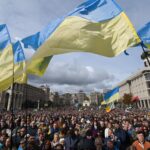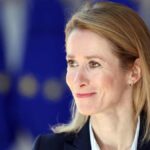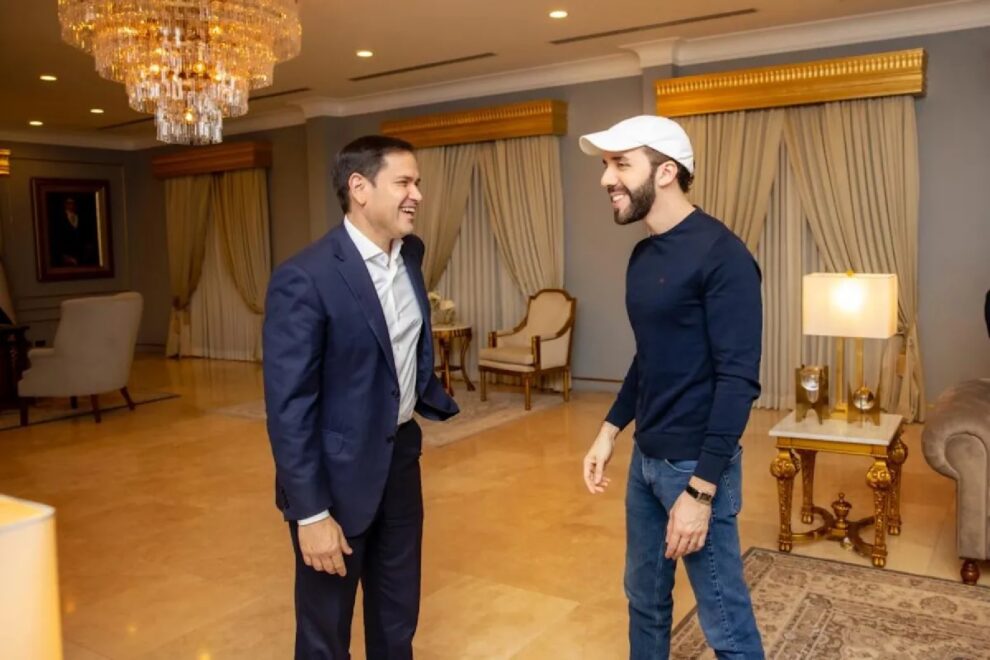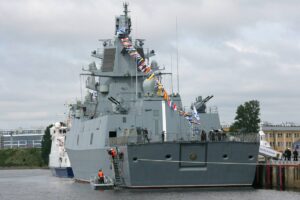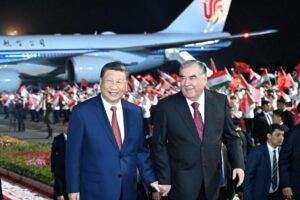Central America, in Brief: Honduras, Nicaragua, and El Salvador’s nods to Russia and China are often read as a jealousy game in the U.S. bilateral relationship. Regional leaders claim sovereignty and multipolarity as their mantra. Experts say that non-ideological short-term calculus and a search for impunity are instead guiding their actions.
In Putin’s Words
On April 5, Vladimir Putin called Honduras “an important partner in Central America,” promising to “expand trade and economic ties, as well as cultural and humanitarian exchanges.” The Russian Foreign Ministry called their agreement to mutually accept university diplomas an “initiative of the Honduran side.”
That same day, at a regional Anti-Inflation Summit in Mexico, President Xiomara Castro insinuated Western responsibility for the war in Ukraine, citing fuel and food prices as motives for a negotiated peace between “NATO, Ukraine, and Russia.”
Initially, Honduras condemned the Russian invasion at the U.N. This February it did so again, though it abstained last October from voting against “illegal so-called referendums” rationalizing Russian annexations.
Castro is shaking up Honduran diplomacy. The day after taking office in January 2022 she restored relations with Nicolás Maduro’s Venezuela. While stressing cooperation with the U.S., she cut ties with Taiwan in March in favor of China, leaving Taipei with Guatemala and Belize as their last Central American allies.
Her government has also sided with Costa Rica, Guatemala, and El Salvador in a pact of silence toward the repression of the Ortega regime in Nicaragua, allowing the country to take the helm of the Central American Integration System (SICA) through 2025.
Soon after, during a visit from Russian Foreign Minister Sergei Lavrov on April 18, Ortega called for Taiwan’s expulsion as an observer of SICA and replacement with Russia. His reason: Taiwan’s backing of the Contras in the 1980s.

From left, Laureano Ortega, the son of Nicaraguan presidential couple Daniel Ortega and Rosario Murillo and their envoy for Russian affairs; Russian Foreign Minister Sergei Lavrov; and Nicaraguan Foreign Minister Denis Moncada in Managua, Nicaragua, Apr. 19, 2023. (Russian Foreign Ministry/TASS/El Faro English)
Nicaragua’s proposal met rapid opposition from Costa Rica and Guatemala, but it underscored the intense debate over the future of the region’s strategic alliances.
“Today’s multipolar geopolitical world calls on countries like ours to be open to plurality in relations,” Eugenio Sosa, head of the Honduran government’s National Institute of Statistics, told Chinese state media outlet CGTN.
“Castro’s decision to cut off relations with Taiwan in favor of China can be explained by her party’s fairly left-wing ideology,” Washington Office on Latin America’s Central America director Ana María Méndez told El Faro English. As we noted in our March 31 edition, energy, infrastructure, and swollen national debt were factors in the change of policy.
Mind Your Business
The Chinese official policy of “non-intervention” in internal affairs also seems seductive for the region. Alongside El Salvador, Guatemala, and Nicaragua, Honduras has demanded respect for sovereignty in the face of U.S. sanctions and purported influence.
Salvadoran President Nayib Bukele, for example, responded to corruption sanctions last July against five-dozen senior officials from El Salvador, Honduras, and Guatemala in capital letters: “UNITED FRUIT COMPANY.”
On China, then-President-elect Bukele asserted in March 2019 that they “develop projects that are not feasible, leaving countries with huge debt that cannot be repaid and use that as financial leverage… They are not a democracy, but they intervene in your democracy.”
That December, he made a state visit to Beijing. Four years into his term, China has offered to finance megaprojects in El Salvador, purportedly “without political conditions,” or even, per Vice President Félix Ulloa, buy the sovereign debt. “Chinese cooperation comes with no strings attached,” Bukele said last August.
Bukele has applied that same cold pragmatism to Russia. For weeks after the invasion of Ukraine, he stayed silent about a state visit to Moscow scheduled for that year —it never happened— and his government has abstained from or skipped all U.N. voting on the war. When the U.S. Treasury and E.U. blacklisted the Russian Central Bank, Bukele tweeted: “The intrinsic value of bitcoin is now on full display”—a wink to U.S. sanctions evasion.
It seems no coincidence that, in the last two years, the only press interviews he has granted are to Tucker Carlson, the leading anti-“woke” commentator dismissed from Fox News who is also skeptical of Western support for Ukraine. Carlson helped Bukele consolidate inroads with U.S. Republicans and far-right echo chambers.
“The Bukele administration has no foreign policy strategy. Rather, they react. He dislikes Biden because the Democrats have expressed concern for his violations of human rights and the constitution,” Rubén Zamora, a historic Salvadoran center-left politician and former ambassador to Washington and the U.N., told El Faro English.
Some observers say any rift with the U.S. can only go so far. “Central American governments cannot forego U.S. support,” a veteran diplomat from the region at a multilateral institution told El Faro English. “I see their (multipolar) decisions not as long-term strategy, but more limited and tied to corruption.”
‘Disorganized Multipolarism’
When Brazilian President Luiz Inácio Lula da Silva traveled to Shanghai in April to meet with Russia, India, China, and South Africa as leader of the BRICS Development Bank, Honduran ex-head of state Manuel Zelaya, husband-advisor to Castro, retweeted that Brazil can “lead the way to a better world.”
The relationship goes back years. When Zelaya was ousted in the 2009 military coup, he took refuge in the Brazilian Embassy. His family spent Christmas 2009 there. In March, with Lula and the Castro-Zelaya family back in power, their delegations met in Brasília to discuss joint development projects.
“It has been evident in the last year and a half that (Castro’s) husband Zelaya is the one making the most transcendent decisions in Honduran political life,” said Méndez of WOLA.
Lula, a standard-bearer of the hemispheric Left, has caught criticism from the West for his suggestion that Ukraine should cede occupied Crimea in his peace-seeking proposal. Ukraine countered that he equated the “victim and the aggressor.”
The Brazilian president has underscored friendliness with Joe Biden while also arguing for Global South nations to seek “relations with everyone” and replacing the U.S. dollar as the reserve currency.
Similarly, Laureano Ortega Murillo, the son of Daniel Ortega and Rosario Murillo overseeing Managua’s relationship with Moscow, talked on Thursday at the National Autonomous University of Nicaragua about ending “the global dictatorship of the dollar.”

Brazilian President Luiz Inácio Lula da Silva, center-right, during a state visit alongside Manuel Zelaya, then-president of Honduras, and First Lady Xiomara Castro, right, in Tegucigalpa, Honduras, August 7, 2007. (Ricardo Stuckert/PR/Government of Brazil)
But Zamora says Central American ties with China or Russia have little to do with traditional political ideologies. “Honduras has done good things in terms of foreign policy,” he asserted, “but they think that being part of the Left is supporting Putin, which is absurd.”
“These countries have no notion of Left or Right. To say that Nicaragua is a revolutionary socialist country is a huge absurdity. China drifts every day more toward capitalism. Russia —it goes without saying— is already capitalist.”
Former Costa Rican President Luis Guillermo Solís (2014-2018) agrees. The region “is in an era of disorganized multipolarism, meaning that ties with global powers are not based on shared ideology,” he told El Faro English.
“Few (non-Western leaders) buy… that the war (in Ukraine) is an existential global threat,” wrote Crisis Group president Comfort Ero in March. “Many chafe at the costs their populations bear, particularly higher food and fuel prices, for a war they see as European.”
Is Guatemala an Exception?
President Alejandro Giammattei was the only regional leader to visit Kiev last year, in solidarity with Ukraine’s “sovereignty.” On April 1, his reciprocal trip to Taiwan drew praise from Washington Republicans. He declared the country “the only true China.”
But if Guatemala has rebuffed Russia and China, it is only, according to Solís, “to capitalize on this disorder to advance its interests,” just as its neighbors do.
The head of conservative Guatemalan business lobby CACIF told Prensa Libre that, on the Taiwan issue, Guatemala has found a comfortable gray area. “We have very strong commerce with continental China which has not been affected by our diplomatic relations with Taiwan, a relationship which, one way or another, we can sustain.”
An extra benefit is to smooth over tensions with the Biden administration over corruption and lawfare. “Guatemala’s international agenda is not that of the U.S. or Europe,” Human Rights Watch Americas’ Juan Pappier said in a recent visit to Guatemala City. “It’s about instrumentalizing foreign policy to secure impunity in their country.”
“COVID-19 scrambled the chess board, in terms of multipolarity and national circumstances,” argued Solís. “It made societies reexamine their core principles, and I think the resurgence of populism has a lot to do with that.”
A Sovereign Populism
Regional leaders capitalize on political turmoil in the U.S. to reposition themselves in their relationship with the Biden administration and dismiss as hypocritical any international denunciations or sanctions of local corruption.
When Donald Trump was indicted in early April on 34 counts of falsifying business records, Bukele, Zelaya, and Mexican President Andrés Manuel López Obrador decried the charges as political persecution.
The Honduran strongman, an old friend of Hugo Chávez, sided with Trump: “The politicization of justice in the financial capital of the empire, the same crude and repudiated historical practice of dictatorships, is now on full display in the United States.”
Source : Latinorebels



